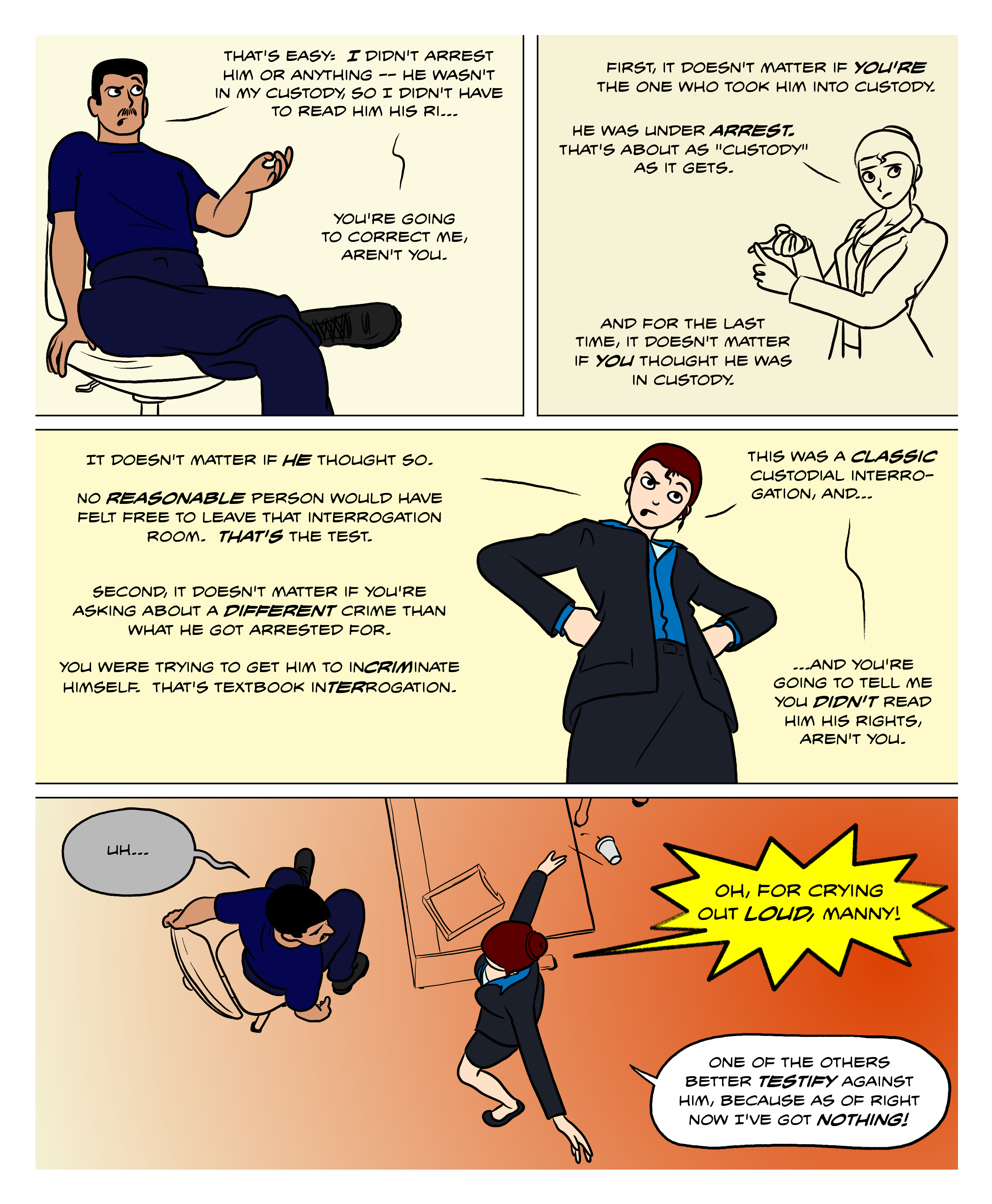|
This is a purely educational website. Nothing here is legal advice or creates or implies an attorney-client relationship. If you have a specific legal issue, PLEASE talk to a lawyer who practices where you live—laws vary from place to place, and how they're applied varies from courthouse to courthouse. Your local county bar association can probably refer someone who handles matters like yours.
By using this site, you agree that you are awesome. Use of this site also constitutes acceptance of its Terms of Service and Privacy Policies, which are known to medical science as a cure for insomnia.
It's best to keep all discussions in the comments. But if you really need to reach Nathan privately, go ahead and email him at n.e.burney@gmail.com. He won't mind.
THE ILLUSTRATED GUIDE TO LAW and the PEEKING JUSTICE logo are pretty damn cool trademarks and should probably be registered one of these days.
© Nathaniel Burney. All rights reserved, though they really open up once you get to know them.
|
|






Wouldn’t he have been read his right in the other case and would that precedent Miranda warning apply to everything he say while in custody?
Eh, isn’t he already going down for the wire fraud that caught him in the first place? Could be worse.
Eh. Isn’t he already going down for the wire fraud that caught him in the first place? Could be worse, I suppose.
Damn it, stupid double posts
It would be nice to have links back to the panel(s) with the original interrogation of each suspect as they come up in discussion with the prosecutor.
Nathan, do you have files with the plaintext of the dialogue spoken by the narrator or characters per page? I’ve thought about writing a search engine for the parts of the comic, but don’t want to transcribe all of the text if you already have it.
All part of Synthcore’s plan!
… he’ll claim later on, anyways.
Yeah, there seems like a disconnect between this page and the previous. It feels like there is something missing in their conversation between one and the next.
No, the detective is addressing Pi’s subtly-but-perhaps-confusingly-worded question at the bottom of the last frame (Love the “You know what I mean…”)
She is not wondering whether she can use the statements (whether or not they establish anything that points to Synthcore’s guilt) but whether she can use the statements (whether or not Synthcore’s 5th amendment protections were respected).
In this frame, Manny is trying to address that by leading with the notion that he didn’t have to read him his rights since he hadn’t arrested him at the point in question. This in turn leads into the development presented on the page.
So, are Miranda warnings a once and done thing? If he had them read at the time of arrest, was taken back to the interrogation room and waited there for 6 hours before any questions were asked, would that earlier reading count six hours later?
Yeah, I’m wondering this too. If that officer didn’t actually arrest him then there’s no reason to assume he wasn’t mirandized
On the contrary, there’s no reason to believe he ever was read his rights. It’s not something that happens automatically on arrest (except on TV). Cops usually wait until they’re conducting a formal interrogation before reading anyone their rights. There’s nothing in the facts presented to indicate anyone ever mirandized him.
If he had been read his rights previously, there might be an issue as to whether this was a continuation of the earlier interrogation, or a new one requiring new warnings. That could have been a fun discussion, but I felt the issue was a little obscure (and rare) to get into in the comic.
“On the contrary, there’s no reason to believe he ever was read his rights. It’s not something that happens automatically on arrest (except on TV).”
Why, though? Wouldn’t it be wiser to read them right away, so that any statements they make on their way to the interrogation can be used against them? Or am I missing something?
Wiser, certainly. Just say the magic words, and you can use the defendant’s words. But just because it’d be wiser, that doesn’t change the fact that it’s usually not done. Except on TV.
Many are even trained specifically not to mirandize anyone until they’re in the interrogation room, on the [incredibly wrong] assumption that people will stop talking once mirandized. There’s an earlier page where this is discussed, I think. They just don’t realize that Miranda is THEIR tool, not the defendant’s shield.
Man, that drink of Pi’s sure is taking a lot of abuse throughout this interview.
Must be something normal for lawyers. I once was visiting a friend of mine, and I noticed an odd stain on the ceiling, which turned out to be coffee, from when her then-bf, an ex-lawyer, had thrown a fit.
Thanks for all of these. If everyone taught law like this, maybe I’d be working on becoming a lawyer instead of what I’m doing currently!
Glad you like it!